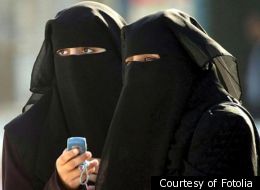Out of a total Muslim population between four and six million, the French government estimates no more than 2,000 women wear a burqa/niqab. Nevertheless, full face veiling in public has been illegal in France since April and those who violate the law risk a ?150 fine. Those who support the law say they are worried about veiled women compromising the nation's secular foundations and undermining women's dignity that comes with gender equality. In addition, some claim that Muslim men are forcing these women to cover their faces, resulting in oppressive isolation. On the other side, opponents argue the law is a pretext to reduce the visibility of Muslims in public spaces.
What then should we think about the political campaign of Kenza Drider, a 32-year-old mother of four who wears a niqab? By running for public office, she is asserting her right to speak in public and participate in democracy, exercising the very civil rights that many westerners claim Muslims do not value. Although she won't be declared an official candidate until she gets the signature of 500 elected officials, Madame Kenza is serious about her campaign, which she sees as a platform from which to challenge Nicolas Sarkozy's ban on full face veiling. "I tried to understand this law," says Drider, the long shot Presidential candidate from Avignon, "and what I understood is that this is a law which puts us under house arrest."

It's hard to see this Muslim woman as oppressed. Maybe Kenza Deider and her colleagues are misguided but they are hardly crushed and isolated. Muslim women are intelligent and need to be left alone to find their own way. "When I was very young I wore the hijab and after one year I knew it wasn't right for me, " says Egyptian journalist, Mona Eltahawy, "but I wore it for nine years and I say it took me eight years to take it off." It is not the government's business to tell women how to dress, says British Muslim journalist and women's rights activist,
Shelina Zahra Janmohamed.
The issue is modesty, but modern scholars agree the particular verses in the Qur'an (24:31-32) asking for it are exceedingly vague and ambiguous. "Believing women should lower their gaze and guard their modesty; they should not display their zeenah (charms, beauty or ornaments) except what must ordinarily appear thereof; they should draw their outer garments over their bosoms." The ambiguity is so significant, says religion historian Reza Aslan, "that a woman who reads the scripture and says 'I am absolutely certain that I am supposed to veil' is just as right as the woman who reads the same scripture and says 'I am absolutely certain that I do not have to veil'." According to Muslim legal philosopher, Abdullahi Ahmed An-Na'im of Emory University, only 30-40% of the world's Muslim women cover their heads or faces either as a deliberate sign of piety or as a political statement.
Historians are also quick to remind us that covering the head has been a concept in Judaism and Christianity as well as in Islam. All traditional depictions of the Virgin Mary show her veiled and nuns have copied this for centuries. Until the 1960s, women who entered Roman Catholic churches were required to cover their hair. Contemporary Orthodox Jewish men still wear the small yarmulke as a sign of respect to God and Jewish law requires married women to cover their hair. Kenza Deider inherited -- or perhaps adopted -- an interpretation of verses 24:31-32 that is ultra conservative. Whether she'll ever choose another interpretation or not, she should have the right to dress as she wants.
In the meantime, there are Muslims who hope to change the hearts and minds of their ultra conservative colleagues through education and debate, not government intervention. Taj Hargey at MECO (Muslim Education Center of Oxford) heads a campaign against full face veiling because he calls it masking and says it has nothing to do with Islam. "It is a pre Islamic custom from Byzantium and Persia that was later integrated into Muslim society and then given a veneer of religion as justification." Shelina Zahra Jamohamed wears a headscarf but she, too is opposed to full face veiling because she interprets the phrase: "except what must ordinarily appear" as a woman's face. "I also believe that Islam is strong on opinion and personality, " she says " and I feel that making sure the face is uncovered allows people to express who they are and assert some kind of identity."
"What the French law has done," says Deider, "is give citizens the right to insult veiled women." This means that full face veiled women seen on the street, on public transportation, shopping or picking up their children from school are fair game for ridicule and contempt. And since there are already moves to create similar legislation in Belgium, The Netherlands and Italy, this means the law is contributing to Islamophobia. Surely, this is counter-productive when what we need are public policies and personal practices that bridge gaps instead of creating them. Let's hope that the courageous Kenza Drider and her campaign will bring these issues into public debate.
?
Source: http://www.huffingtonpost.com/nancy-graham-holm/frances-law-against-full-_1_b_1100896.html
tay sachs watch the walking dead giuliana and bill giuliana and bill 2012 camry endometriosis 9 9 9 plan
No comments:
Post a Comment
Note: Only a member of this blog may post a comment.